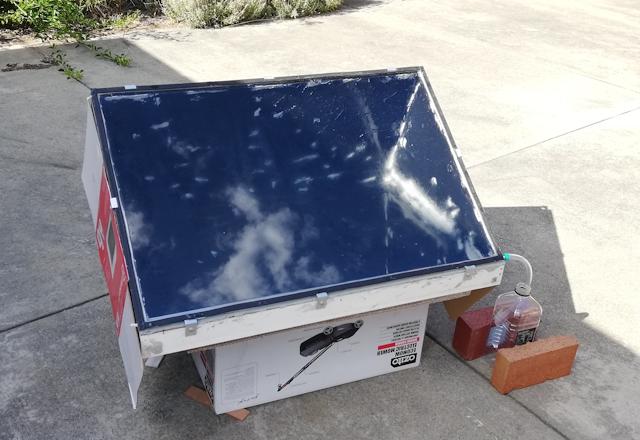First test basin type proto 1
Yesterday I posted some design notes, and construction details of
a first prototype of a simple basin-type solar water distiller, using
parts found in my garage:
https://bkhome.org/news/201911/simple-basin-solar-distiller-design-notes.html
After knocking it up, further reading revealed some design
shortcomings. However, this first prototype will probably be useful for
"ball park" measurements, to see if this type has potential. As already
stated, I was very surprised at the claimed output of the Rainmaker 550,
and if I can also achieve this level of efficiency, then this simple
design looks like the best way for me to go.
Here in Perth, Western Australia, we are having our first summer
heatwave. Prediction today was 40 degC (104 Fahrenheit), superb day for
testing!
I set it up early in the morning. The previous evening, I had stuck
some cardboard on the sides, a rather feeble attempt to improve the
insulation, don't know if it will make much difference. Here it is,
photo taken at 8.20am, the sun has just hit the top corner:

...I only put in 3 litres of water, as efficiency is said to be
improved with less water depth. Glass is 600x900, as is outside
dimensions of the base, so water depth is only a few millimetres.
Oriented the panel for peak output at about 11am, and waited for the
sun to march across the panel. About 9.00am had sun on all of the panel,
and a tiny bit of distilled water appeared, so started measuring from
9.00am.
9.00am. Some gusty wind. Sunny sky with some fluffy clouds.
10.30am. Sun: 870 W/m2, ambient: 31 degC, temperature about
3/4 up the panel, IR sensor about 2 inches away from glass: 53 degC, 1/4
up: 52 degC, back side of distiller, about 2 inches away: 39 degC
12.00 noon. Only very slight breeze. Fluffy clouds mostly gone. Sun: 890 W/m2, ambient: 34 degC, 3/4: 64 degC, 1/4: 63 degC, back: 45 degC
1.30pm. Sun: 960 W/m2, ambient: 38 degC, 3/4: 64.7 degC, 1/4: 64 degC, back: 48 degC
3.15pm. Stop.
Collected distilled water: 1.525 litres
Collection duration was 6 hours and 15 minutes, so collected 244
millilitres/hour. Collection area is 0.568x0.868 metres2 which is 0.493
m2.
Now for the exciting part, to compare with the F-Cubed panel.
Different weather conditions of course, so this comparison is a very
rough guide only. Refer to prototype #4 results:
https://bkhome.org/news/201911/solar-distiller-prototype-4-first-test.html
Quoting, result for prototype #4:
the collection: 1.1 litres, in 7 hours. That is 157 millilitres/hour. The cloth has a surface area of 0.3327 m2, so to compare efficiency with the F-Cubed panel which is 1 m2, need to scale up: 157*(1/0.3327) which is 471.9 ml/hr. The F-Cubed panel gave 563.6 ml/hr, so the test has a comparable efficiency of 83.7%.
Today's test (simple basin type, prototype 1) also needs scaling: 244*(1/0.493) which is 495 ml/hr. Efficiency relative to the F-Cubed panel is 87.8%
Wow! And that's with a design that probably has room for improvement.
I must re-state that these comparison percentages may be way off. The F-Cubed was tested mid-winter, full sun but much lower ambient temperature. I really do need to set up my panels alongside each other for a proper comparison test.
The most obvious improvement that can be done, as seen from today's
test, is to improve thermal insulation on sides and bottom. At 1.30pm,
the back side of the panel measured 48 degC, 10 degC above ambient.
Another area of improvement will be to decrease glass angle, and
bring glass very close to the water surface. There is however, a
tradeoff, as if sun angle to the glass is more than about 70 degrees off
perpendicular then it just reflects off the glass. A balance needs to
be found, to suit summer and winter sun angles.
Tags: nomad
